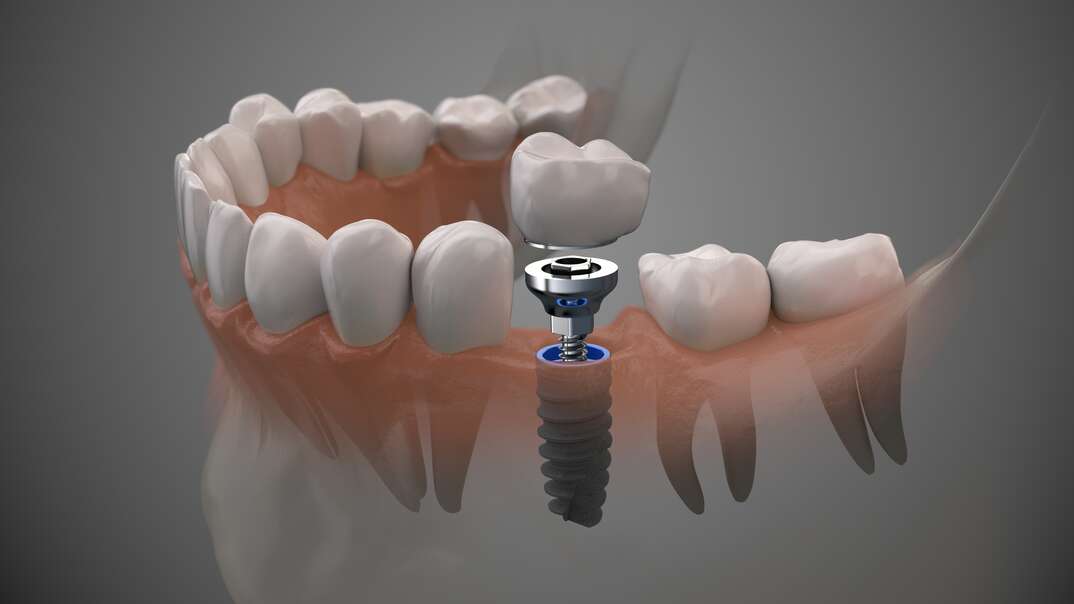- AppliancesElectriciansHVACLandscapingLocksmithPest ControlPlumbingRenovationRoofingT V RepairAll Home Improvement
- Car AccidentClass ActionCorporate LawCriminal DefenseDivorce LawEmployment LawFamily LawFinancial LawLegal AidMedical Injury LawyersMedical MalpracticeReal Estate LawWater Fire RestorationAll Legal
- InvestmentRetirementAll Finance
- Animal InsuranceAutoGeneral InsuranceHealth PolicyHome RentersAll Insurance
- DentalHealth SpecialistsAll Medical
- Animal CareVeterinaryAll Pets
- Auto GlassTowingAll Automotive
How to Care For Your Dental Implants

Most of us reach adulthood with a full set of permanent teeth. But what happens when those so-called permanent teeth become MIA?
If you're considering dental implants to replace one or more teeth, you may wonder how much extra care they require, especially after surgery.
Dental implants provide a sturdy base for replacement teeth so you can chew, smile and speak with ease. Made from bio-friendly substances, like titanium or ceramic, dental implants resemble small screws. Most are placed surgically into the jaw bone to create a solid foundation for crowns, bridges and other artificial teeth. After the dental implant procedure, you may need to take extra care of the surrounding area.
Once your dentist fits your prosthetic tooth or teeth in place, your implant acts as a root, keeping everything secure so you can enjoy your favorite foods again. Dental implants help you avoid sliding bridges and dentures, which can make eating or talking difficult.
Types of Dental Implants
Depending on your oral history and health, your dentist or periodontist may recommend endosteal or subperiosteal implants. Learn about the two types, including dental implant care, below.
- Endosteal dental implants are conventional dental implants suitable for healthy individuals with a reliable jawbone. The prosthetic roots in the form of screws or cylinders are positioned into the jawbone.
- Subperiosteal dental implants don't go into the jawbone. Instead, they sit on top, with posts within the gum to hold them in place. Patients with weak jawbones or bone loss may be good candidates for this type of dental implant.
It can take a while for the implant site to heal and even longer before your dentist can set the final replacements. During that time, your care instructions from your dentist or periodontist may change. Make sure you continue to follow your treatment plan throughout the entire process.
Caring for Dental Implants Immediately After Surgery
When you return home after surgery, the implant area may be red, swollen and painful. Follow these tips to help make the healing process more comfortable.
- Your surgeon may provide you with medication for pain, infection or swelling. Make sure you take all medications as instructed.
- You may wish to use an ice pack to help control swelling and pain, especially within the first 24 hours.
- Take it easy, especially for the first few days. This isn't the time to clean the house, wash the car or start an exercise program.
- Avoid chewing directly on the implant area, and start with soft foods.
- Carefully clean the implant site as recommended by your surgeon.
- Continue to brush and floss your other teeth as usual. However, you may wish to switch to a soft-bristle brush and avoid overly abrasive toothpaste.
- Avoid smoking and alcohol. Both can contribute to slower healing rates.
More Related Articles:
How Often Should You Go to the Dentist?
Do Dentists Offer Payment Plans?
Everything You Need to Know About Emergency Dentists
How Much Does a Dental Cleaning Cost?
Long-Term Care for Dental Implants
Your dental implant and attached prosthetic teeth are an amazing feat of modern dentistry. However, it's important to remember that an implant isn't a natural tooth. Therefore, you must give special care to your gums and the tissues surrounding the implant. Healthy gum tissue helps prevent infections and complications.
Start with good oral hygiene, brushing and flossing your teeth two or more times a day if possible.
- Use a soft-bristle toothbrush that your dentist has approved. You may want to consider a rotary battery-operated toothbrush or interdental brush for ease of use.
- Water flossers can help remove debris and stimulate gum tissue.
- Implant-specific floss provides deep-cleaning oral care.
- Your periodontist may recommend a rinsing agent to help reduce bacteria in the mouth.
As time goes by, you should schedule regular checkups with your dentist to monitor the implant's condition and evaluate the health of the surrounding tissue. Your dental implants can keep you smiling and chewing for many years — as an investment in your oral health, they’re worth the extra care.
Elocal Editorial Content is for educational and entertainment purposes only. The information provided on this site is not medical advice. Editorial Content is not intended to be used for diagnosis or treatment. We are not physicians or a substitute for advice from a physician. The opinions, beliefs and viewpoints expressed by the eLocal Editorial Team and other third-party content providers do not necessarily reflect the opinions, beliefs and viewpoints of eLocal or its affiliate companies. Use of the Blog is subject to the
Website Terms and Conditions.The eLocal Editorial Team operates independently of eLocal USA's marketing and sales decisions.



